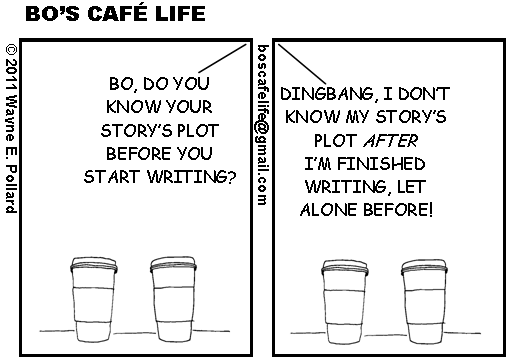Paul Whybrow
Full Member
Various writing experts have come up with theories about how many types of story plots there are, and one of the best-known is Christopher Booker's list from his book Seven Basic Plots: Why We Tell Stories.
Summarised, they are:
*Overcoming the Monster
*Rags to Riches
*The Quest
*Voyage & Return
*Comedy
*Tragedy
*Rebirth
I remember feeling slightly offended when I first heard this theory, annoyed that something I love doing—reading books—had been analysed and broken down into a formula. Since returning to creative writing, I'm more aware of how plotting needs to follow long-established conventions to succeed with potential readers.
It's all very well to boast that your novel is "genre-busting" or that you've written experimental literature,
but you're defying centuries of convention and are likely to confuse someone browsing for a book to read. We're all librarians at heart, relying on organised systems to find stuff. It's how we get through life with minimum hassle.
My own Cornish Detective series novels are, like most crime stories, plotted to Overcome the Monster. I rather like the sense of justice involved in that, which is why I've found writing short stories for competitions so challenging this summer, as several were based on Tragedy or Rebirth. My crime novels show the wound of the crime, but my protagonist detective provides a source of healing by righting a wrong. My short stories had no neat conclusion, so sat there like a weeping ulcer!
What sort of novels do you write plot-wise?
Do you agree with Christopher Booker's plot categories, or can you think of other types of stories?

Summarised, they are:
*Overcoming the Monster
*Rags to Riches
*The Quest
*Voyage & Return
*Comedy
*Tragedy
*Rebirth
I remember feeling slightly offended when I first heard this theory, annoyed that something I love doing—reading books—had been analysed and broken down into a formula. Since returning to creative writing, I'm more aware of how plotting needs to follow long-established conventions to succeed with potential readers.
It's all very well to boast that your novel is "genre-busting" or that you've written experimental literature,
but you're defying centuries of convention and are likely to confuse someone browsing for a book to read. We're all librarians at heart, relying on organised systems to find stuff. It's how we get through life with minimum hassle.
My own Cornish Detective series novels are, like most crime stories, plotted to Overcome the Monster. I rather like the sense of justice involved in that, which is why I've found writing short stories for competitions so challenging this summer, as several were based on Tragedy or Rebirth. My crime novels show the wound of the crime, but my protagonist detective provides a source of healing by righting a wrong. My short stories had no neat conclusion, so sat there like a weeping ulcer!
What sort of novels do you write plot-wise?
Do you agree with Christopher Booker's plot categories, or can you think of other types of stories?

